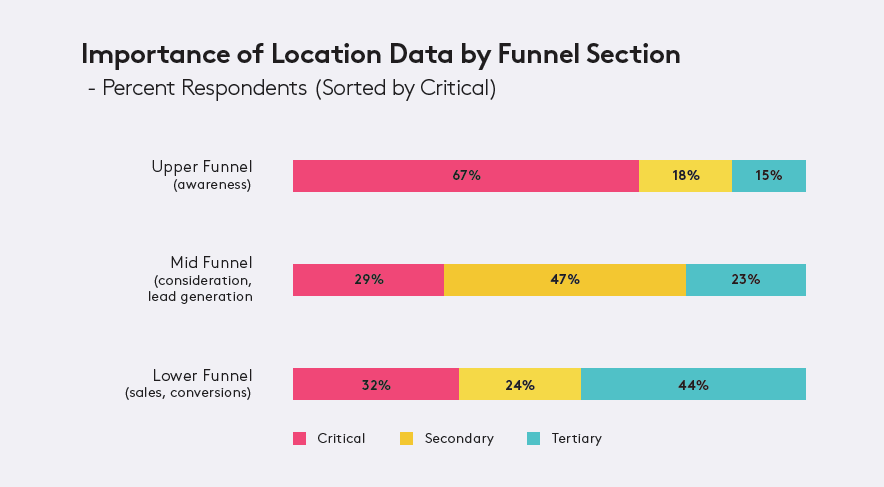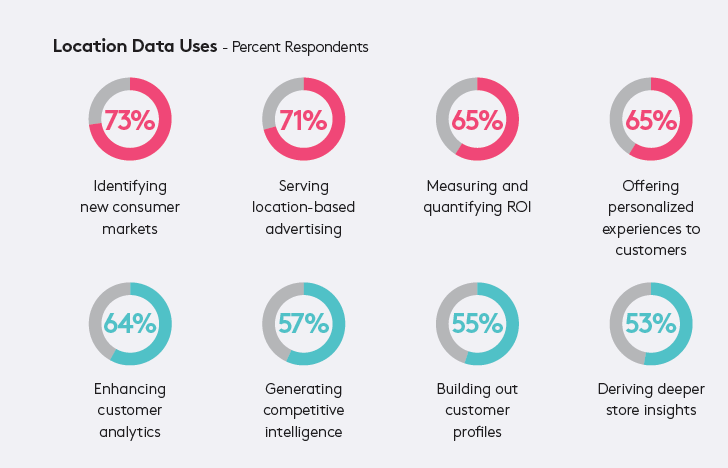Data Scout is Localogy’s series that curates and draws meaning from third-party data. Running semi-weekly, it adds an analytical layer to the industry data that we encounter in daily knowledge building. For Localogy original data, see the separate Modern Commerce Monitor™️ series.
Over the past two months, we’ve examined Foursquare’s ongoing data on local-commerce foot traffic patterns — specifically in light of dynamic behavior due to lockdowns and reopening. Foursquare essentially put its location intelligence engine to work to reveal insights about Covid-era consumer behavior.
Like the rest of us, it now wants to move on and get back to business. With one eye on the pandemic and acknowledgment of its still at-large status, Foursquare has shifted its attention and put its data publishing energy into another report: Location Data in a Marketing Lifecycle.
Its goal is to put validation behind the notion that location targeting and attribution strategies can boost performance and returns in marketing. By acknowledging bias in such narratives, Foursquare commissioned third-party firm Advertiser Perceptions to survey marketers on their use of location intelligence.
What did it find out? At a high level, a clear majority of marketers consider location data important and are engaged in using it. Specifically, the most common uses of location data include identifying new consumer markets, ad serving, attribution and creating personalized content and ads.
Respondents also report that their use of location intelligence spans the purchase funnel. They’re using it to improve effectiveness in driving awareness and consideration, as well as conversion and loyalty. A majority of respondents also report that location data has been effective in each of these functions.

Here are a few more select findings.
— Key benefits reported for location intelligence include improved engagement and receptiveness (48%), improved ROI (48%), relevant content for consumers (37%) and measurement (35%)
— The majority of marketers responded that location data delivered excellent performance when it comes to digital campaign attribution (62%), advanced metrics (55%), retail layout (53%) and KPI forecasting (50%).
— Location attribution applied to TV is particularly notable, with 55% of those surveyed saying it provides value.
— 51% of marketers expect digital ad spend allocation to increase in a post-Covid world, and 51% expect the importance of location data to increase. 47% state that it will remain as important as it is now.
— Marketers predicted the number of location-based campaigns for 2020 would represent double-digit increases over 2019 (true across small and large overall digital ad budgets).

Some of this is notable in its departure from reporting seen elsewhere on Covid-era ad budget retractions. But it’s nonetheless a good confidence signal. We’ll have to keep watching for ad spending impact, particularly for various flavors of location-targeted marketing.
Beyond overall ad-budget impact, we could see spend shifts within existing budgets. And there, it’s possible that location-based advertising benefits. For consumer brands, communicating at a local level — especially if it entails practical information on reopening details and policies — could take priority.
This will continue to be a moving target, but getting the buy side’s sentiments is a valuable exercise. Stay tuned for more from our own coverage, and check out the full report from Foursquare here.



